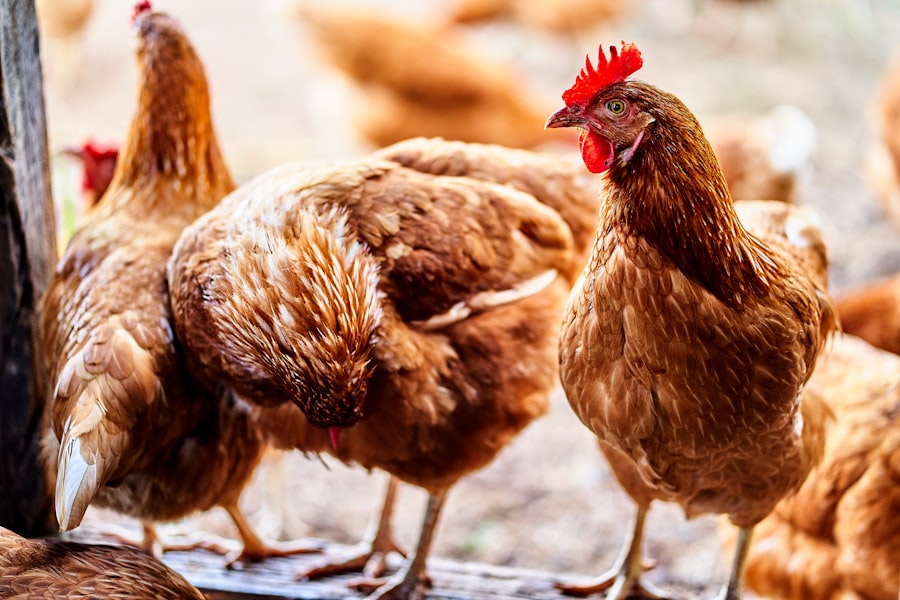Keeping chickens has become an increasingly popular hobby for many people, whether it be for the joy of having fresh eggs daily or simply as pets. The idea of having a small flock of chickens in your backyard has gained traction in recent years, as more and more people are becoming interested in sustainable living and self-sufficiency. Not only do chickens provide a constant supply of fresh eggs, but they also offer companionship and entertainment. In this article, we will explore the benefits of raising chickens, how to choose the right breed, setting up a chicken coop, feeding and watering chickens, maintaining a clean coop, handling and caring for chickens, protecting them from predators, and troubleshooting common problems.
Key Takeaways
- Keeping chickens has many benefits, including fresh eggs, natural pest control, and fertilizer for your garden.
- When choosing a breed of chicken, consider factors such as egg production, temperament, and climate adaptability.
- A well-designed chicken coop should provide adequate space, ventilation, and protection from predators.
- Chickens require a balanced diet of feed and fresh water, as well as occasional treats like fruits and vegetables.
- Regular cleaning and maintenance of the chicken coop is essential for the health and well-being of your chickens.
Benefits of Raising Chickens
One of the main benefits of raising chickens is the ability to have fresh eggs daily. There is nothing quite like going out to your backyard and collecting eggs that were laid just hours ago. Not only are these eggs incredibly fresh and delicious, but they are also more nutritious than store-bought eggs. Chickens that are allowed to roam freely and eat a varied diet produce eggs that are higher in omega-3 fatty acids, vitamin E, and beta-carotene.
In addition to the benefits of fresh eggs, chickens can also make wonderful pets. They have unique personalities and can be quite entertaining to watch. Many chicken owners find that their birds become part of the family and enjoy spending time with them in the yard. Chickens can also be trained to come when called and can be quite affectionate towards their owners.
Another benefit of raising chickens is the opportunity to use their manure as fertilizer for your garden. Chicken manure is high in nitrogen, phosphorus, and potassium, making it an excellent natural fertilizer. By composting chicken manure and using it in your garden, you can improve soil fertility and promote healthy plant growth.
Choosing the Right Breed of Chicken
When it comes to choosing the right breed of chicken, there are several factors to consider. First and foremost, you need to think about your specific needs and environment. If you are primarily interested in egg production, you will want to choose a breed that is known for its high egg-laying capabilities. Some popular egg-laying breeds include the Rhode Island Red, Leghorn, and Sussex.
If you are more interested in chickens as pets, you may want to consider breeds that are known for their friendly and docile nature. Some popular pet breeds include the Silkie, Orpington, and Wyandotte. These breeds are known for their calm temperament and make great companions.
It is also important to consider the climate in which you live. Some breeds are better suited to cold climates, while others thrive in warmer environments. Doing some research on different breeds and their specific characteristics will help you make an informed decision.
Setting up a Chicken Coop
Having a chicken coop is essential for keeping chickens. It provides them with a safe and secure place to roost, lay eggs, and seek shelter from the elements. There are several different types of chicken coops available, ranging from small portable coops to larger permanent structures.
When choosing a chicken coop, it is important to consider the size of your flock and the space available in your yard. You will need to provide at least 4 square feet of space per chicken inside the coop, as well as an outdoor area for them to roam during the day.
The materials needed to build a chicken coop can vary depending on your budget and personal preferences. Some common materials include wood, wire mesh, and roofing materials. It is important to choose materials that are sturdy and will provide adequate protection for your chickens.
Chicken Coop Size and Design
The size of your chicken coop is an important factor to consider when setting up your flock. Chickens need enough space to move around comfortably and engage in natural behaviors such as scratching and dust bathing. As a general rule of thumb, you should provide at least 4 square feet of space per chicken inside the coop. This means that if you have 6 chickens, your coop should be at least 24 square feet in size.
Proper ventilation is also crucial for a healthy chicken coop. Good airflow helps to prevent the buildup of ammonia from chicken droppings and keeps the coop dry and free from mold and mildew. You can achieve proper ventilation by installing windows or vents in the coop, as well as ensuring that there is enough space between the walls and roof for air to circulate.
Lighting is another important consideration when designing your chicken coop. Chickens need natural light to regulate their internal clocks and lay eggs consistently. If your coop does not have access to natural light, you can install artificial lighting to mimic daylight hours. This will help to ensure that your chickens continue to lay eggs throughout the year.
When it comes to the design of your chicken coop, there are many options to choose from. Some popular designs include A-frame coops, hoop coops, and stationary coops. Each design has its own pros and cons, so it is important to consider your specific needs and preferences when making a decision.
Feeding and Watering Chickens

Providing proper nutrition for your chickens is essential for their health and well-being. Chickens require a balanced diet that includes a mix of grains, protein, vitamins, and minerals. There are several different types of chicken feed available on the market, including pellets, crumbles, and mash. It is important to choose a feed that is appropriate for the age and breed of your chickens.
In addition to commercial feed, you can also supplement your chickens’ diet with kitchen scraps and garden waste. Chickens are omnivores and will eat a wide variety of foods, including fruits, vegetables, and even meat. However, it is important to avoid feeding them anything that is toxic or harmful to their health.
Clean water is also essential for chickens. They need access to fresh, clean water at all times to stay hydrated and maintain good health. It is important to provide water in a clean and sturdy container that cannot be easily tipped over or contaminated by droppings.
Maintaining a Clean Chicken Coop
Keeping a clean chicken coop is crucial for the health and well-being of your flock. A dirty coop can lead to the buildup of bacteria, parasites, and disease, which can negatively impact the health of your chickens. Regular cleaning and maintenance are essential to prevent these issues.
There are several tools that you will need for cleaning a chicken coop. These include a rake or shovel for removing bedding and droppings, a broom or brush for sweeping out the coop, and a hose or pressure washer for washing down surfaces. It is important to wear gloves and a mask when cleaning the coop to protect yourself from bacteria and dust.
The frequency of cleaning your chicken coop will depend on the size of your flock and the type of bedding you use. As a general rule, you should clean out the coop at least once a week. This involves removing all bedding, droppings, and any other debris from the coop, as well as washing down surfaces with a disinfectant.
Handling and Caring for Chickens
Proper handling and care are essential for the health and well-being of your chickens. When handling chickens, it is important to be gentle and calm. Chickens can become stressed easily, so it is important to approach them slowly and avoid sudden movements.
Regular grooming is also important for chickens. This includes trimming their nails and beaks to prevent overgrowth and injury. You should also check their feathers regularly for signs of parasites or disease and provide any necessary treatments.
Monitoring the health of your chickens is crucial for early detection and treatment of any potential issues. You should observe your chickens daily for any signs of illness or injury, such as changes in behavior, loss of appetite, or abnormal droppings. If you notice any concerning symptoms, it is important to seek veterinary care as soon as possible.
Protecting Chickens from Predators
Chickens are vulnerable to a wide range of predators, including raccoons, foxes, coyotes, and birds of prey. It is important to take steps to protect your flock from these predators to ensure their safety.
One of the most effective ways to protect chickens from predators is to use fencing. A sturdy fence that is buried at least 12 inches into the ground will help to keep out digging predators such as raccoons and foxes. You should also consider using netting or wire mesh to cover the top of the coop and run to prevent birds of prey from swooping down and attacking your chickens.
Being vigilant and proactive is also important when it comes to protecting your chickens from predators. This means checking the coop and run regularly for signs of damage or weakness and repairing them promptly. It also means being aware of your surroundings and taking precautions such as locking up your chickens at night when predators are most active.
Troubleshooting Common Chicken Problems
As with any animal, chickens can experience a variety of health and behavioral issues. Some common problems that chicken owners may encounter include egg-laying issues, such as soft-shelled eggs or egg binding, respiratory infections, mites or lice infestations, and injuries.
If you encounter any of these problems, it is important to take action quickly to prevent further complications. There are several ways to troubleshoot these problems, including adjusting their diet, providing appropriate medical treatments, and making changes to their environment.
In some cases, it may be necessary to seek professional help from a veterinarian who specializes in poultry. They will be able to provide a proper diagnosis and recommend the appropriate treatment for your chickens.
Keeping chickens can be a fun and rewarding hobby or a practical way to have a constant supply of fresh eggs. In this article, we have explored the benefits of raising chickens, how to choose the right breed, setting up a chicken coop, feeding and watering chickens, maintaining a clean coop, handling and caring for chickens, protecting them from predators, and troubleshooting common problems. By following these guidelines and providing proper care and attention, you can enjoy the many benefits of keeping chickens in your backyard.
If you’re interested in advice on keeping chickens, you might also find this article on large chicken coop ideas helpful. It provides valuable insights and creative solutions for creating a spacious and comfortable living environment for your feathered friends. Whether you’re a beginner or an experienced chicken keeper, this article from Poultry Wizard offers practical tips and inspiration to ensure your chickens have plenty of room to roam and thrive. Check it out here.
FAQs
What are the benefits of keeping chickens?
Keeping chickens can provide a source of fresh eggs, fertilizer for gardens, and entertainment. They also help control pests and weeds in the yard.
What do chickens need to be healthy?
Chickens need access to clean water, a balanced diet, shelter from the elements, and protection from predators. They also need space to move around and exercise.
What should I feed my chickens?
Chickens need a balanced diet that includes protein, carbohydrates, vitamins, and minerals. Commercial chicken feed is available at most feed stores and can be supplemented with fresh fruits and vegetables.
How often do I need to clean the chicken coop?
The chicken coop should be cleaned at least once a week to prevent the buildup of feces and bacteria. The frequency of cleaning may need to be increased depending on the number of chickens and the size of the coop.
What are some common health problems in chickens?
Common health problems in chickens include respiratory infections, mites and lice, and egg-laying issues. It is important to monitor your chickens for any signs of illness and seek veterinary care if necessary.
Do I need a rooster to have eggs?
No, a rooster is not necessary for hens to lay eggs. Hens will lay eggs regardless of whether or not there is a rooster present. However, if you want fertilized eggs to hatch into chicks, a rooster is necessary.
Meet Walter, the feathered-friend fanatic of Florida! Nestled in the sunshine state, Walter struts through life with his feathered companions, clucking his way to happiness. With a coop that’s fancier than a five-star hotel, he’s the Don Juan of the chicken world. When he’s not teaching his hens to do the cha-cha, you’ll find him in a heated debate with his prized rooster, Sir Clucks-a-Lot. Walter’s poultry passion is no yolk; he’s the sunny-side-up guy you never knew you needed in your flock of friends!







